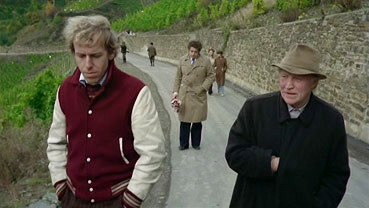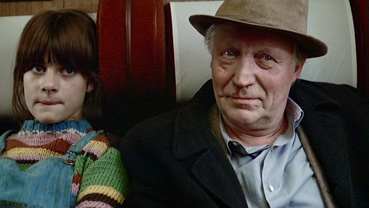"I've
never amounted to much. I hope it will stay that way." |
Benhard
Landau |
Wilhelm
is going nowhere. Mind you, he's not exactly trying to go
anywhere, or even thinking of trying. He quite fancies
being a writer but just can't get it together to actually
write anything. Fed up with his attitude, his mother buys
him a train ticket to Bonn and encourages him to go off and see something
of life. He accepts the offer. Why not? On the train he
meets an old man with a nosebleed named Laertes and his silent
young female companion Mignon and ends up paying for their
tickets and their dinner. On reaching their destination, the three
lodge at the same hotel, where they are joined by Therese, a woman
Wilhelm was previously watching from the train window, a well known
actress who passed her phone number to him via a train guard.
A brief discussion on poetry in the hotel dining room attracts
the interest of Austrian guest Bernhard, who follows and
joins the group.
OK,
let's stop here. It's unlikely that any of the above is
going to convince you that The Wrong Move [Falsche Bewegung] is a must-see or even,
if you're feeling ungenerous, of any particular interest.
But then this is not a film where plot is of real importance,
so descriptions of such are not that revealing.
Wilhelm's journey is defined by his encounters and interaction
with others, not by what he does or, for the most part,
where he goes. An exception to this has Bernhard invite
the group to a country house owned by his uncle, only to
realise he's at the wrong place. This turns out not to be a problem because the
owner invites them to stay anyway, their timely arrival
having disrupted his suicide attempt, and the home becomes a decaying
externalisation of the group's weary world view.

Collectively
the group is representative of a widespread disenchantment
particular to post-WW2 Germany, and how completely you connect
with the characters and their many discussions will depend
in part on your awareness of the reference points contained
within. Certainly I can make no claims here of total appreciation
of what some German reviews I've read have immediately recognised
and responded to. None are obviously spelt out but are
intriguingly alluded to, with Laertes' long-delayed back
story probably the easiest for outsiders to comprehend and
process, though even then detail is kept deliberately light.
And
yet it all remains curiously involving, and I do mean curiously,
as nothing about the main characters is instantly appealing
beyond their 'what's going on here?' enigma, a question
that the film never really answers. And despite
his age (he appears to be in his early thirties), Wilhelm's
sense of alienation from society is one many will recognise
from their own teenage years, and perhaps beyond. It's that
odd affinity that appears to provide the hook to stay with
him and see the world largely through though his eyes, while his refusal to commit to anyone or anything in particular
at times feels like a peculiar kind of nihilistic freedom.
Amiably
played by Rüdiger Vogler, who had previously worked
with Wenders on The Goalkeeper's Fear of the Penalty [Die Angst des Tormanns beim Elfmeter] (1972) and The
Scarlet Letter [Der Scharlachrote Buchstabe] (1973), and starred in his previous film Alice
in the Cities [Alice in den Städten] (1974), Wilhelm is a magnet for like-minded souls, drawn
to each other for no other purpose than to engage in discussion
on a world that none of them seem to be comfortable with. Indeed,
there was a point midway through where I wondered if I was
watching people who had died and were caught in limbo,
walking the earth and philosophising on what they had lost,
a notion dispelled by a discovery that could almost have
been written to deliberately snap me out of that supposition.
At
the journey's end it is uncertain if Wilhelm has learned
anything or changed his world view, despite his briefly
upbeat response to a request to film a pair of tourists
who mimic the skills of his departed companions. This does suggest
an autobiographical element on Wenders' part, a man disconnected
from a world in which he feels wrongly placed but who briefly
finds purpose through the lens of a movie camera. In this
respect the film accurately reflects its time, capturing
the directionless nihilism that many of us experienced in
the 1970s, which could well prove a barrier for an audience
regularly bombarded with the current Just Do It bullshit of corporate
optimism.

The
Wong Move is certainly not a crowd pleaser, and
to many it will feel as aimless and rambling as its central
character. But as someone who did not get many of the cultural
references that some reviewers have revelled in, I was nonetheless
consistently engaged by the characters, their conversations,
the performances (including a screen debut of a 14-year-old
Nastassja Kinski as the silent Mignon), by Robby Müller's
typically fine cinematography (the long tracks as the group
walk and talk up a hillside are particularly memorable),
and by the feeling that Wilhelm's journey is one that I
long ago embarked on myself and that, in some small but
recognisable way, have been walking ever since.
Anamorphic
1.77:1, this is another fine transfer from a very good source
print for Anchor Bay's box set, with no complaints at all
about colour, contrast or detail. Once again some sources
suggest an original aspect ratio of 1.66:1, but there is
no obvious sign of picture cropping.
The
mono Dolby 2.0 track is also available as 5.1, but apart
from some of the music being pushed around the soundstage,
and even then only a bit, this is essentially the same track,
with the sound centrally located rather than spread across
the front speakers.
Nope.
The commentary on the US release is, of course, missing,
and would be a welcome addition.
Regarded
as a masterpiece by some, The Wrong Move
is a film it took me time to warm to, and even then not one
I felt the immediate need to re-watch (although doing so
did clarify some, though not all, of the cultural references
that I missed the first time round). But it's still an intriguing
film that captures a mood and attitude that was not confined to 1970s Germany, and will no doubt completely bemuse
a sizeable portion of the information-age audience, and
certainly piss off anyone looking for a fast moving tale
with twisty plots and traditional character arcs. Once again
the transfer does the film proud, but the lack of a commentary
leaves us pining for what should have been.
|